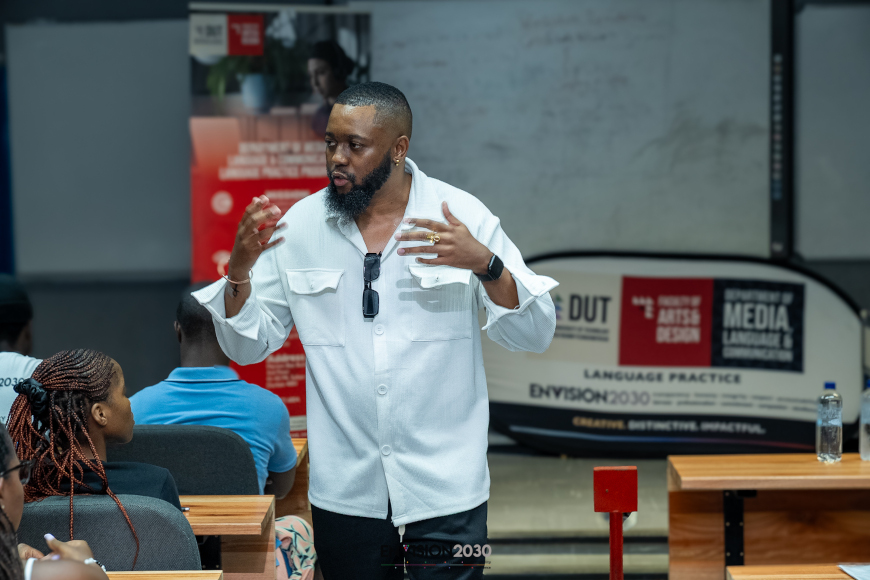The Durban University of Technology (DUT) Language Practice programme hosted Ernest Nkomotje, a distinguished writer from the Time of the Writer, a long-standing festival hosted by the Centre for Creative Arts at the University of KwaZulu-Natal. The event aimed to promote literature and encourage DUT students to embrace storytelling and personal stories as a metaphor of their society, which guest writer, Ernest Nkomotje called a ‘grammar of understanding.’
The on-going collaboration between the Centre for Creative Arts and DUT’s Language Practice programme is designed to enrich the students’ academic experience by giving them a chance to engage directly with authors and literature. According to Dr Rachel Matteau Matsha, Senior Lecturer in the Department of Media, Language, and Communication at DUT, such partnerships foster exchanges and collaboration.
“These partnerships are important more especially for cross-institutional collaboration. The Time of the Writer is now in its 28th year and goes beyond being a ‘UKZN festival’; it is an important cultural event in Durban,” said Dr Matsha.
Dr Matsha further explained that the Language Practice programme invites writers from the festival to share their personal literary journeys with students for the past few years. This year, the Centre for Creative Arts chose Ernest Nkomotje to share insights on adaptability and courage in the challenging landscape of modern storytelling.
Co-founder of the Hibirist Group, Nkomotje co-authored the book Introducing Hibirism: A Guide to Black Cultural Nuance, which proposes a cultural philosophy derived from the social greeting ‘hibiri’, which gained popularity through the 2006 hit song Sister Bethina by Mgarimbe). ‘Hibirism’ adds depth and meaning to the salutation and signifier ‘hibiri’, and according to its website, the book “contains humorous anecdotes, thought-provoking ideas, witty banter, and profound observations on black life, showcasing Hibirism at play.”
According to Nkomotje, the book explores the nuances of South Africa’s racial groups to help businesses gain cultural insights. “The book focuses on the nuances that define racial groups in South Africa and how you can read these nuances to generate insight for business,” he said.
Nkomotje also emphasized the value of such sessions and collaborations in nurturing young writers. “The session highlights the importance of partnerships and collaborations such as this one where authors, intellectuals and innovative businesses come to university spaces like these. They are very important because they bring content that is shared in these spaces alive. So, how is the content living in the real world?” he asked.
In addition, Nkomotje expressed the importance of partnerships between writers and universities, ensuring their work remains relatable to a wider audience. “It’s key that these partnerships are developed, maintained, and nurtured as they bring authors and writers back into the university space,” he added.
Dr Matsha concluded the event by sharing her appreciation for these partnerships. “When we organised a session with the Centre for Creative Arts, we never know who the guest writer will be, but we are lucky all the time as you also saw today,” she said. She also expressed her belief in the importance of fostering more inter-institutional partnerships in the fields of language, media, and communication.
The Time of the Writer event at DUT offered students an opportunity to engage with literature and gain real-world insights into the creative process. Through continued collaborations like these, Time of the Writer and stakeholders are helping to shape a new generation of intellectuals, writers and storytellers in Durban.
Picture caption: Co-founder of the Hibirist Group and author Ernest Nkomotje.
Photographer: Khulasande Tshayile.
Nkosingiphile Dladla

